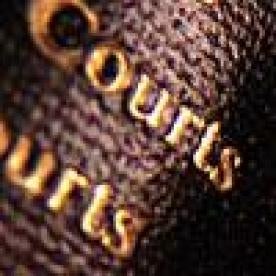Undaunted by an approaching hurricane that had already shut down the federal government, public transportation and nearly all of the rest of Washington, D.C., the U.S. Supreme Court on October 29, 2012, heard oral arguments in a copyright case involving the unauthorized resale in the United States of foreign versions of textbooks originating from U.S. publishers. While significant portions of the East Coast were shut down, the Supreme Court peppered counsel for both parties and the government with a constant stream of difficult questions that did not indicate how the Court will rule. Kirtsaeng dba Bluechristine99 v. John Wiley & Sons Inc., Case No. 11-697 (U.S. Supr. Ct.) (oral arguments held 10/29/12).
U.S. textbook publisher John Wiley & Sons brought a copyright infringement suit against Supap Kirtsaeng, a University of California graduate student from Thailand. Kirtsaeng’s family and friends shipped him foreign editions of textbooks printed abroad by Wiley Asia, which Kirtsaeng then sold in the U.S. on commercial websites such as eBay for substantial profit. Kirtsaeng offered the defense of the first sale doctrine, but the district court prohibited him from raising the defense and rejected its applicability to foreign editions of textbooks. Accordingly, a jury found Kirtsaeng liable for willful copyright infringement and awarded Wiley damages of more than half a million dollars. Kirtsaeng appealed to the U.S. Court of Appeals for the Second Circuit, which affirmed the trial court. In April 2012 the U.S. Supreme Court agreed to hear the case. (See IP Update, Vol. 15, No. 5).
In copyright law, the first sale doctrine permits the owner of a lawfully made copy of a copyrighted work to resell or otherwise dispose of that copy without limitations imposed by the copyright owner. The doctrine is also referred to as exhaustion, providing that once a lawfully made copy of a copyrighted work is distributed by the copyright owner, the owner’s exclusive right of distribution with respect to that copy is exhausted, and the owner of the copy may dispose of it as it sees fit. Kirtsaeng gives the Supreme Court a second chance to answer the question of whether the first sale doctrine provides a defense if a foreign-made work is imported and resold in the United States without the copyright owner’s permission, a question that, when Justice Kagan’s recused herself in that case, resulted in a 4-4 deadlock in the Court’s 2010 Costco Wholesale Corp. v. Omega S.A. case. If upheld, the 2d Circuit’s affirmation of the trial court’s ruling that the first-sale doctrine only provides a defense for copies that are manufactured in the United States would mean that copyright owners need only move their manufacturing abroad to obtain perpetual control over the redistribution of their works.
During oral arguments, the Supreme Court posed tough questions in quick succession to each side, as well as to the U.S. Deputy Solicitor General Malcolm Stewart, who had requested permission to participate in oral arguments as amicus curiae. While the justices’ pointed questions exposed flaws in the positions of each party and the government, the questioning was even-handed, such that there was no clear “winner” or strong indication of how the Supreme will rule.
Almost immediately after Kirtsaeng’s counsel began presenting his argument, Justice Ginsburg criticized Kirtsaeng’s position in that it would drastically reduce the rights of copyright owners more than any other country in the world. Adopting Kirtsaeng’s position would change the United States from a national exhaustion scheme to an international exhaustion scheme, meaning that a first sale anywhere in the world of an article containing U.S. copyrighted material would exhaust the copyright owner’s exclusive right of distribution. The current system provides that a U.S. copyright owner’s exclusive right of distribution is only exhausted after a first sale in the United States. Justice Ginsburg pointed out that the Supreme Court had been informed that no country had adopted such a “universal exhaustion” regime and that most countries adhere to a national exhaustion scheme,” commenting that, “[Kirtsaeng’s] argument is asking for something that runs against the regime that is accepted in most places.”
Although Justice Ginsburg’s questioning of Kirtsaeng’s counsel could hint towards rejection of Kirtsaeng’s position, other justices posed difficult questions to Wiley’s counsel that could indicate the opposite. Justice Breyer pressed the U.S. book publisher’s attorney for answers concerning outcomes to multiple hypotheticals of the “parade of horribles” that could occur if Wiley’s position is adopted. Justice Breyer asked Wiley’s attorney if he would be an infringer if he were to travel abroad, purchase five copies of a book printed overseas for the overseas market, bring them back to the United States and give copies to relatives. Justice Sotomayor and Justice Kennedy also sought answers concerning consequences of the “horribles” posed by petitioner. For example, Justice Sotomayor questioned under Wiley’s position whether a library that acquired a copy of a book overseas could import it and lend it out in the United States.



 i
i


